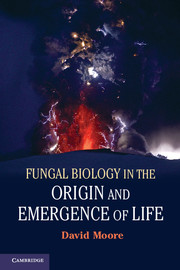Book contents
- Frontmatter
- Contents
- 1 Learning from life on Earth in the present day
- 2 Essentials of fungal cell biology
- 3 First, make a habitat
- 4 The building blocks of life
- 5 An extraterrestrial origin of life?
- 6 Endogenous synthesis of prebiotic organic compounds on the young Earth
- 7 Cooking the recipe for life
- 8 ‘It’s life, Jim . . .’
- 9 Coming alive: what happened and where?
- 10 My name is LUCA
- 11 Towards eukaryotes
- 12 Rise of the fungi
- 13 Emergence of diversity
- References
- Index
7 - Cooking the recipe for life
Published online by Cambridge University Press: 05 February 2013
- Frontmatter
- Contents
- 1 Learning from life on Earth in the present day
- 2 Essentials of fungal cell biology
- 3 First, make a habitat
- 4 The building blocks of life
- 5 An extraterrestrial origin of life?
- 6 Endogenous synthesis of prebiotic organic compounds on the young Earth
- 7 Cooking the recipe for life
- 8 ‘It’s life, Jim . . .’
- 9 Coming alive: what happened and where?
- 10 My name is LUCA
- 11 Towards eukaryotes
- 12 Rise of the fungi
- 13 Emergence of diversity
- References
- Index
Summary
As I have shown above, there are several ways to synthesise prebiotic organic compounds, all of which seem to be realistic, though the extent of their contribution to the early Earth will in most cases depend on the exact environmental circumstances in the place and at the time that they arise. Nevertheless, any one or (most likely) all of the following processes will allow for the synthesis of at least some organic molecules that would contribute to making the Earth habitable (Bernstein, 2006; Cady, 2001; Ehrenfreund et al., 2002, 2005; Ehrenfreund & Cami, 2010; Zahnle et al., 2007, 2010):
Spark discharge synthesis: in practice this means lightning but also includes the effects of high energy solar radiation, especially UV, in the atmosphere. The outcome depends on the oxidation state of the atmosphere and on how much hydrogen is/was present; but although yields of organic products might be limited in the general atmosphere, considerable quantities of biogenic organic molecules could be made locally during volcanic eruptions (Parker et al., 2011).
Hydrothermal vent synthesis: high temperature chemistry in the water outflow of deep-ocean (black smoker) vents can generate interesting chemical pathways but the stability of amino acids and other compounds in these environments remains problematic, and such vents may actually purge the seawater of biogenic molecules. Cooler, alkaline (white smoker) vents support a wide range of organic synthesis and readily support production of bubbles bounded by an inorganic membrane across which a proton gradient is naturally established (Martin & Russell, 2007; Simoncini, Russell & Kleidon, 2011), which might be the primeval ancestor of chemiosmotic coupling; ‘an energy source that must have been available to emergent life’ (Russell, 2010).
- Type
- Chapter
- Information
- Fungal Biology in the Origin and Emergence of Life , pp. 85 - 94Publisher: Cambridge University PressPrint publication year: 2013



